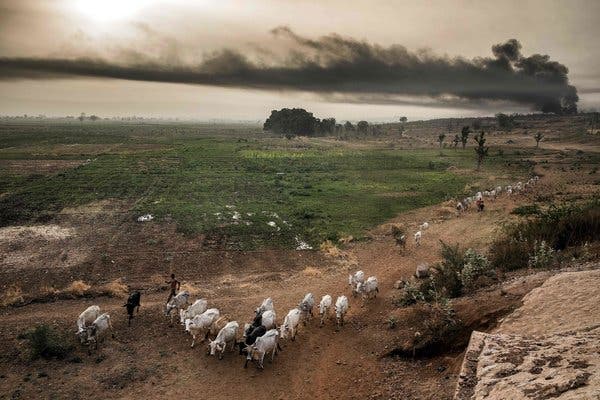The Urgent Need for Climate Awareness in Ghana
In many parts of Ghana, the saying “What you don’t know won’t kill you” is often used to dismiss serious issues. However, when it comes to climate change, this adage no longer holds true. The reality is that ignorance about climate change is proving to be extremely dangerous and, in some cases, deadly.
Across the country, there are clear signs of human-induced climate changes that are becoming increasingly difficult to ignore. These include rising temperatures, unpredictable rainfall patterns, prolonged droughts, and sudden floods. These are not distant scientific predictions—they are real-time events that are disrupting lives, destroying livelihoods, and threatening ecosystems.
Despite these growing challenges, awareness and understanding of climate change among the general population, especially in rural communities, remain alarmingly low. This lack of knowledge poses a significant barrier to effective action and adaptation.
A Startling Knowledge Gap
According to the 2022 Afrobarometer survey, only 22% of Ghanaians reported having heard of climate change and understood its meaning. Even more concerning is that nearly half of the respondents had never heard of it at all. This lack of awareness persists despite dire scientific warnings. The Environmental Protection Agency (EPA) estimates that by 2080, average temperatures could rise by 2.5°C, while rainfall may decrease by up to 30% in certain regions.
These changes would have devastating effects on Ghana’s agriculture sector, which is the economic backbone of rural communities, particularly in the Northern, Upper East, and Upper West Regions. Smallholder farmers in these areas rely almost entirely on rain-fed agriculture, making them highly vulnerable to climate disruptions.
The World Food Programme (WFP) reports that over 1.6 million Ghanaians are at risk of food insecurity due to climate-induced crop failures. In coastal areas like the Volta Region and Greater Accra, rising sea levels are eroding land, homes, and livelihoods. Ghana is ranked among the most climate-vulnerable countries in West Africa according to the Climate Vulnerability Index.
Yet, public education and awareness efforts remain limited and inconsistent, especially in remote rural areas where access to information is scarce.
Community Perceptions and Misconceptions
In many villages, people are beginning to notice changes in the climate, but they often lack the scientific understanding to explain them. Without accurate information, some turn to spiritual or religious interpretations.
At Gomdakura in the Mion District, a farmer named Mr. Alhassan Abu was seen disposing of used weedicides into a nearby stream. He appeared unaware of the environmental consequences of his actions. “These floods and droughts are just natural events that come and go,” he said, dismissing concerns about pollution or human factors contributing to climate change.
For Elder Elijah Tumakavi, a church leader in Kpandai, climate change is less a scientific issue than a divine sign. “These droughts and turbulent times are signs of the end days,” he said, referencing biblical prophecies about famine and hardship before the end of time.
Similarly, Mr. Moom Lijol, a traditional leader in Latagim, believes the climate crisis is a form of spiritual punishment. “We are suffering because of the sins and wickedness of mankind,” he said. “The floods and droughts are retribution for our wrongdoings.”
These perspectives highlight a deep disconnect between environmental realities and public understanding. It underscores the urgent need for culturally sensitive climate education that respects traditional beliefs while introducing scientific facts.
The Science of Climate Change and Its Impact on Livelihoods
Climate change refers to long-term alterations in temperature and weather conditions in a region. While some changes occur naturally, recent trends are largely driven by human activities such as burning fossil fuels, deforestation, and industrial emissions. These activities release greenhouse gases like carbon dioxide, methane, and nitrous oxide into the atmosphere, trapping heat and leading to extreme weather events.
Dr. Mahama Wayo Smith, an Agriculture and Food Security Researcher and Lecturer at Tamale Technical University, explained that climate change is already disrupting ecosystems, agriculture, and water resources in Ghana. Erratic rainfall and prolonged dry spells make it difficult for farmers to predict planting seasons, resulting in lower yields and increased food insecurity.
He also noted that climate change is increasing the risk of heat-related illnesses, cardiovascular complications, and the spread of diseases such as malaria, cholera, and respiratory infections.
Dr. Smith emphasized the importance of empowering vulnerable communities, especially women and youth, with the knowledge and tools needed to understand and respond to these challenges.
Recommendations: Bridging the Knowledge Gap
To address the climate knowledge gap and build resilience across communities, several steps are crucial:
- Tailored Awareness Campaigns: These should use local languages, community radio, drama, and storytelling to effectively communicate climate concepts. Involving religious and traditional leaders can enhance credibility and reach.
- Educational Integration: The Ghana Education Service must prioritize integrating climate science and adaptation strategies into school curricula. Children can act as powerful messengers, spreading new knowledge within their families and communities.
- Collaborative Projects: Government, NGOs, and local leaders should work together to implement visible, practical adaptation projects such as climate-smart agriculture, rainwater harvesting, and early warning systems. These initiatives can serve as both learning hubs and resilient tools.
Conclusion
Climate change is no longer a distant or abstract issue—it is here, and it is affecting the most vulnerable first. Bridging the climate knowledge gap through education, grassroots engagement, and policy support is not just necessary but urgent.
By combining traditional wisdom with modern science, Ghana can empower its communities to adapt, survive, and thrive in the face of a changing climate.







